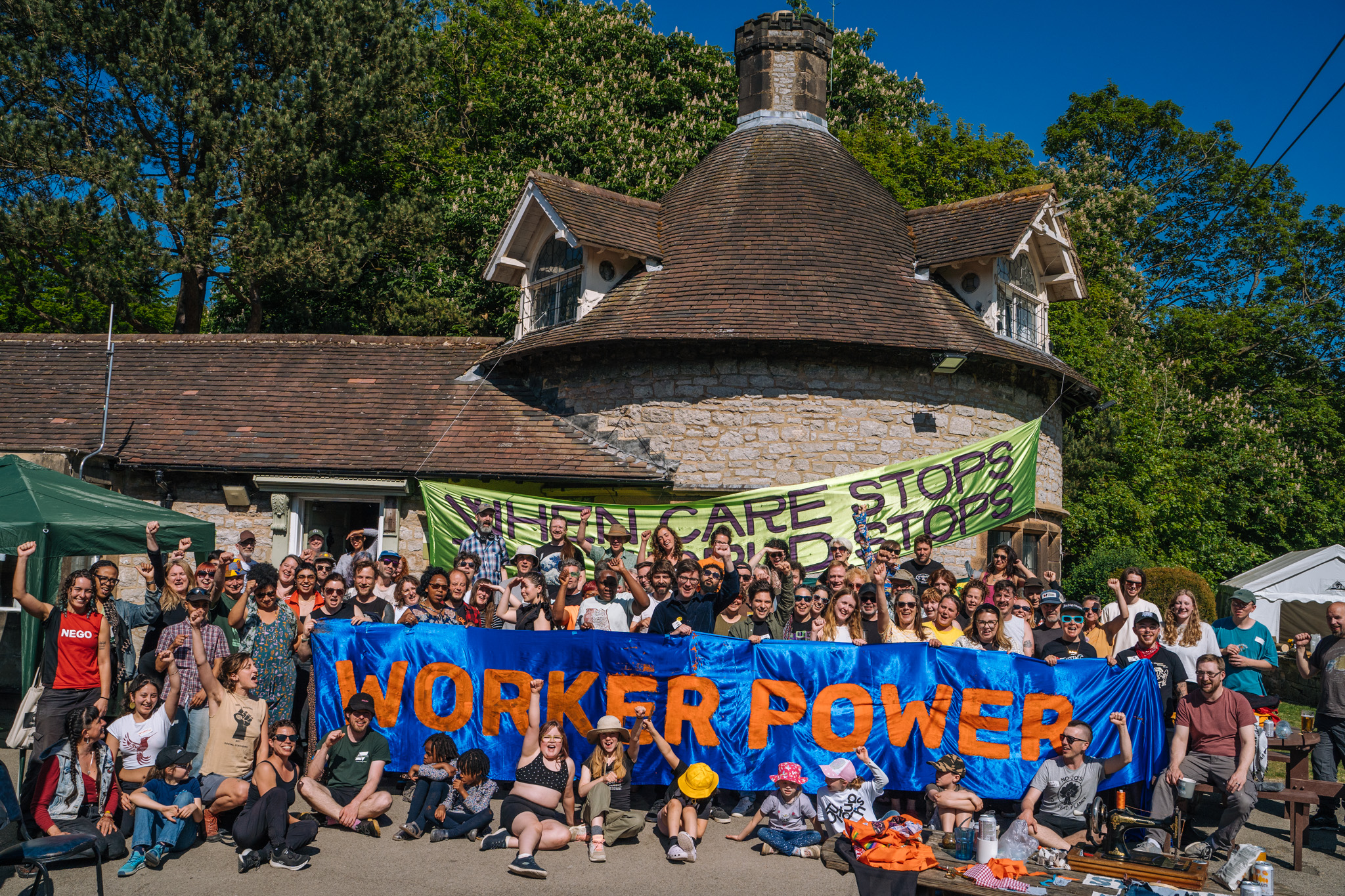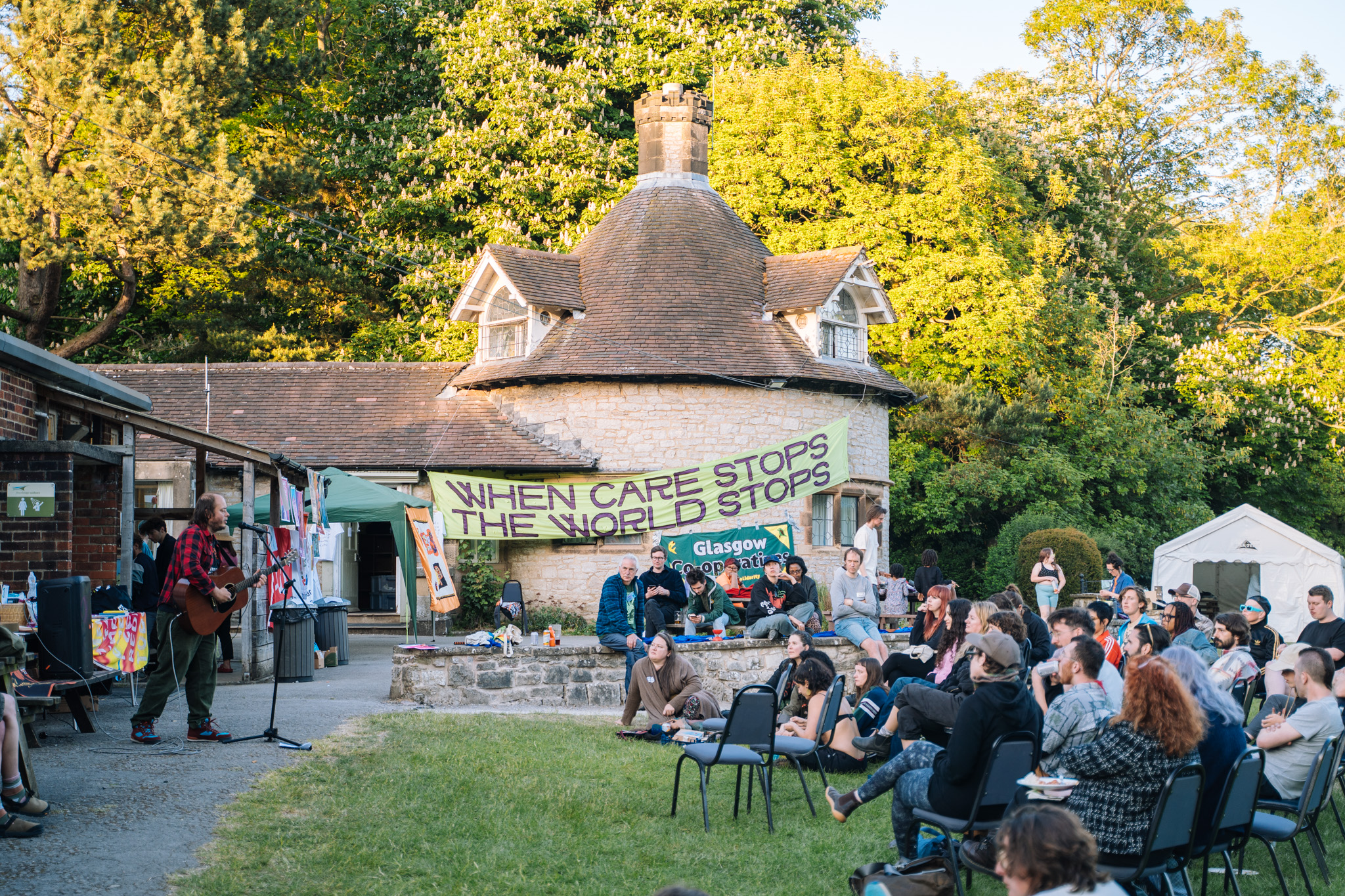
Photo credit: Mikaela/workers.coop
As in previous years, workers.coop members and supporters gathered in the Peak District of England for their annual weekend of learning, collaborating, and surviving the crisp night air in their tents.
Surrounded by the picturesque scenery, the “DIY festival” brought together around 100 people from across the UK, who spent the weekend engaging in workshops and debates, learning and teaching new skills, and building relationships. In true cooperative fashion, everyone pitched in to help: from cooking and washing up after meals to making sure that we leave the campsite spotless, we worked together to make the weekend run smoothly.
Boredom was not an option during the weekend. Whether you wanted to learn about and discuss key topics relevant for cooperatives, get your hands dirty with practical workshops, or immerse yourself in nature by walking the Monsal Trail or going wild swimming, there was something for everyone. Demonstrating the diversity and strength of the UK cooperative movement, the sessions organised and led by workers.coop members reflected the range of skills, interests and causes of the UK cooperative movement: there were vibrant discussions on migrant worker organising, the political history of UK coops, saving music and arts venues; and workshops on mushroom growing by Myco Manchester Co-op, bike repair by Leeds Bike Co-op, and zine-making by the Good Press Glasgow Co-op and Migrants in Culture. Evenings were filled with live folk music, campfire chats, and delicious vegan meals and snacks provided by Veggies, SUMA, and Unicorn.

Photo credit: Mikaela/workers.coop
The weekend provided a great insight into how the UK cooperative movement is built on radical solidarity and inclusion. To ensure that those with children were able to join the gathering, childcare was provided by the Nanny Solidarity Network and volunteers, making it possible for more people to fully enjoy the activities over the weekend – a reminder that inclusion is not an afterthought, but foundational to how the cooperative movement operates. But the strong values of the cooperatives movement were also demonstrated by one of the most popular sessions during the weekend, “Workplace Strategies for Palestine Solidarity”, where workers.coop members, from the smallest to the more influential, shared the measures they have taken to support Palestine and the BDS (Boycott, Divest, Sanction) methods they have implemented against Israel. Additionally, a solidarity fundraiser was organised, with the funds being donated to the members of Yalla co-op and their networks affected by the ongoing genocide in Palestine.
Indeed, the event clearly demonstrated the internationalist perspective of the UK cooperative movement, which looks beyond the borders of the country not only to provide help, but also to learn from each other and thus strengthen the movement as a whole. The session organised by FACTICC, the Federation of Technology, Innovation and Knowledge Work Cooperatives from Argentina highlighted this, as discussions took place about the UK and Argentine movements’ relationship with technology and the rise of platform cooperatives.
While the event was organised by workers.coop for their members and supporters, it also served as a powerful reminder of CECOP’s vital work in supporting our members across Europe through networking, mutual learning, capacity-building, and thus ensuring that the development of worker cooperatives, as well as social cooperatives and cooperatives of self-employed producers, takes place as a collective effort.
The cooperative movement’s strength lies in solidarity, both local and international. Despite different national realities and legislative frameworks that can range from sophisticated, supportive ones to the virtually non-existent, the cooperative movement is united in its efforts to build an economy based on social responsibility and democracy. To strengthen it and create conditions in which cooperatives can thrive globally, we must continue to work together across borders. Only by joining forces can we develop the cooperative ecosystem, where even the most vulnerable people in society can feel welcomed and empowered.







 Employment & Social Inclusion
Employment & Social Inclusion  Entrepreneurship
Entrepreneurship Sustainable Growth
Sustainable Growth 

